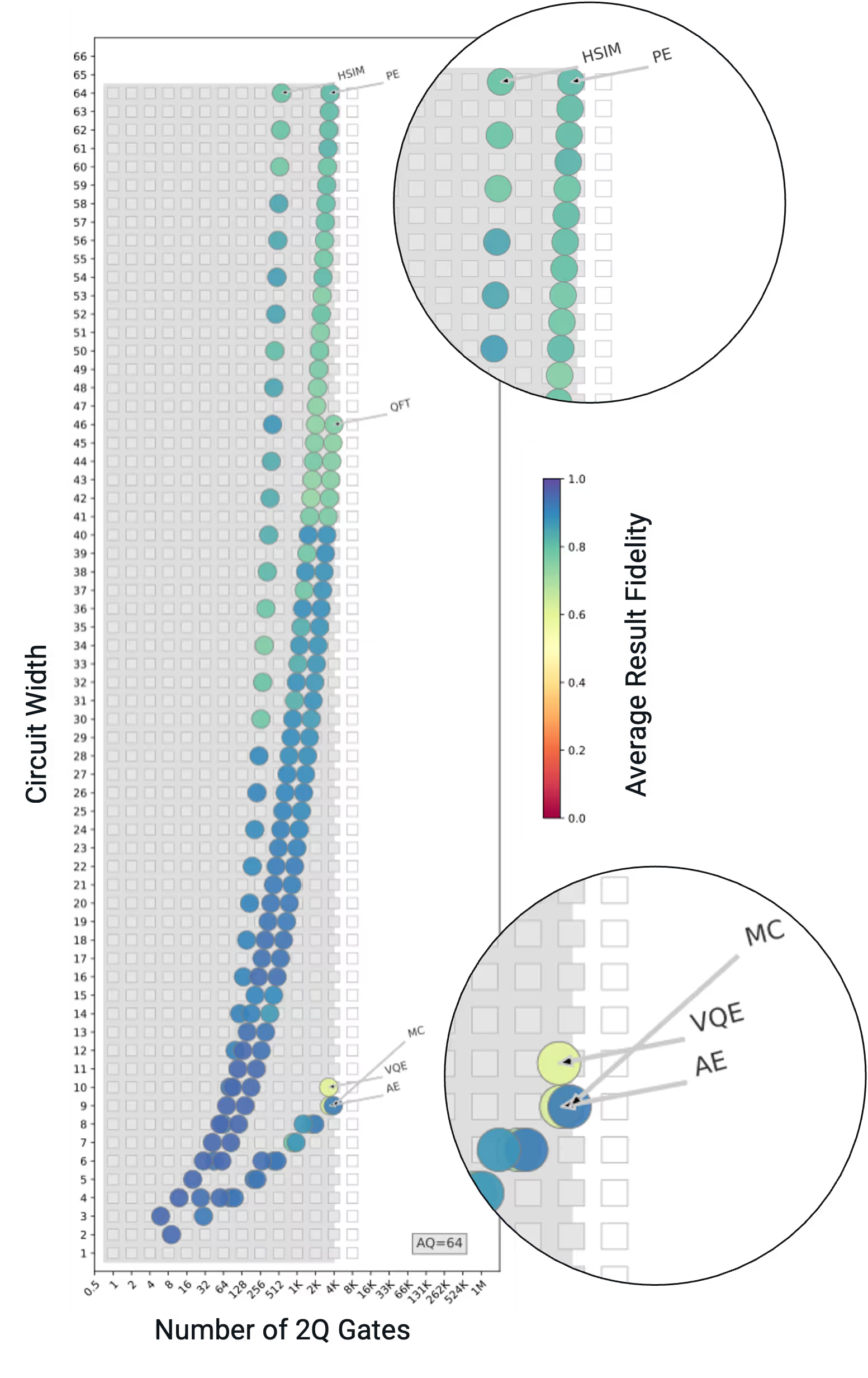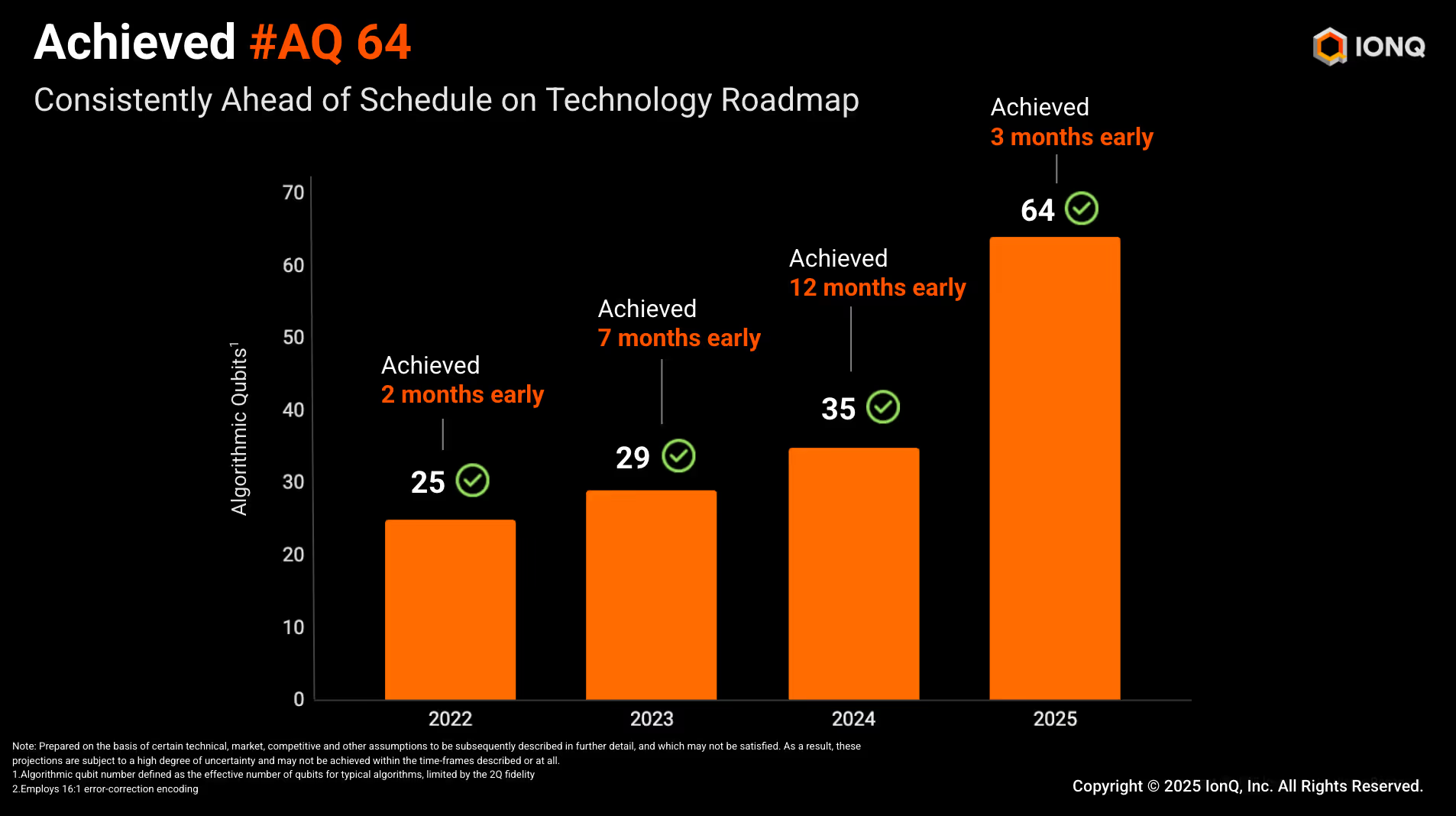IonQ Hits #AQ 64 Milestone Ahead of Schedule — And Sets Its Sights Even Higher

Delivering on every past roadmap commitment—even as we chart a faster course forward
We are excited to announce that we have achieved #AQ 64 on an IonQ Tempo development system three months ahead of schedule, marking the latest milestone on our published performance roadmap. This achievement sets a new high-water mark for commercially relevant quantum capability, underscoring IonQ’s progress in advancing its innovation and leadership in the broader quantum computing landscape. This blog post will dive into the technical progress made since we achieved #AQ 35 a year ahead of schedule in January 2024.
This milestone fulfills our 2025 performance target ahead of schedule and represents the highest validated algorithmic qubit score achieved on a quantum system to date. At IonQ, our near-term roadmap is built around delivering practical quantum advantage, which until recently was measured against the Algorithmic Qubit (#AQ) benchmark.
With #AQ 64, IonQ Tempo – the company’s fifth-generation quantum computer – is expected to be capable of commercial advantage for certain applications, with a computational space that is 36 quadrillion times larger than IBM’s current publicly available quantum systems.
As our technology has advanced, we have evolved our benchmarking methodology to align with evolving customer needs and partner feedback. Our approach measures the performance, power, accuracy, and economic efficiency of our quantum systems. It includes key performance metrics (such as median physical two-qubit gate fidelity, number of logical qubits, logical error rates, and connectivity) as well as a collection of industry-relevant application benchmarks.
This new approach gives customers a direct view into how IonQ’s quantum systems can add value in their industries, and compare these benchmarks against any other commercial system. At IonQ’s Analyst Day on September 12, 2025, we showcased side-by-side comparisons demonstrating how our current generation of quantum systems stack up against competitors. IonQ’s Aria and IonQ Forte systems outperformed three of IBM’s top systems, as well as other commercially available systems, with a wide margin across three widely used industry algorithms:
- 34.7% improvement in solution quality, running an optimization algorithm (QAOA) used for solving complex problems where exact solutions are infeasible – such as in finance, logistics, materials, pharma, AI/ML, energy, and more.
- 73.9% improvement in solution quality, running a foundation algorithm (QFT) used for mapping quantum states into frequency space for cryptography, chemistry, and signal processing.
- 181.6% improvement in solution quality, running a search algorithm (FAA) for large and noisy datasets, relevant in optimization, AI/ML, security, and beyond.
In the #AQ benchmark, each incremental increase in #AQ score effectively doubles the system’s useful computational state space, and with #AQ 64, our upcoming fifth-generation quantum computer, Tempo, is positioned to consider over 18 quintillion (2⁶⁴) different possibilities per circuit execution, more than 268,435,456 times more powerful than #AQ 35. This is also true for classical simulation of quantum systems, where simulating 64 qubits with high precision becomes impractical due to incredibly high simulation costs. This progress comes amid IonQ’s continued investment in full-stack innovation, including recent acquisitions that have strengthened the company’s computing capabilities.
Full-Stack Innovation: Building Towards #AQ 64 on IonQ Tempo
Just as with previous IonQ systems, we view performance through the lens of end-to-end customer value, not just isolated hardware specs. That means thinking holistically about how applications, hardware, and software work together to maximize the utility of the system.
Since delivering #AQ 36 in December 2024, our teams have made significant progress in core technology areas. The most notable improvement is nearly doubling the size of the computational register from 36 to 64 qubits. In our Tempo development system, this was achieved in a single ion chain with all-to-all connectivity. Controlling a quantum system of this size required advanced gate pulse development as well as improvements to the control technology. Finally, we dramatically improved our error mitigation and compiler capabilities. We expect all of these changes to directly benefit Tempo’s future customers as we pave the road to a useful 100 qubit register.
From the outset, our team members have been dedicated to delivering world-class performance in quantum computing, and as we look ahead toward our next-generation Tempo system, our goal is to rapidly move from narrow commercial advantage to broad commercial advantage across several application areas. Tempo is designed with advanced capabilities, including faster gate speeds, more qubits, and mid-circuit measurement as well as improved fidelity. These improvements make it possible for Tempo to unlock solutions to more complex, large problems.
This will, in turn, expand the scope of quantum application areas, including energy grid distribution improvements, pharma drug discovery, engineering simulation modeling, supply chain optimization, and enhanced fraud and anomaly detection.

Looking Beyond #AQ 64
Through recent acquisitions, IonQ has expanded and accelerated its roadmap to deliver increasingly powerful quantum systems. Together with this progress, IonQ’s achievement of #AQ 64 demonstrates the company’s momentum and signals the start of a new era in scalability and performance measurement. Together with our expanded roadmap, #AQ 64 sets the stage for maturing the components and technology layers that make large-scale quantum systems increasingly accessible with exponential scaling growth.
Through continued investment in our research and development roadmap, innovation and strong engineering, we aim to demonstrate a system with two million physical qubits by 2030, a target that aligns with both our technology roadmap and our vision of enabling fault-tolerant commercial quantum systems at scale. As the field of quantum computing continues to evolve, so will the way we measure progress and gauge performance. Going forward, IonQ plans to start reporting a series of indicators that are widely used across the industry, including:
- Number of physical qubits
- Median two-qubit gate fidelity when using physical qubits
- Number of logical qubits
- Logical error rates

These metrics will provide a standard view of our system’s specs, and can be supplemented with various application benchmarks that offer a more specific view of value per use case or industry. As IonQ systems continue to scale with more qubits and higher fidelity, we’ll be able to take on increasingly complex problems. This opens the door to a wider range of quantum applications, from chemistry and materials science to drug discovery, finance, logistics optimization, and beyond.
We’re proud to have reached our 2025 performance milestone ahead of schedule, and our focus remains on pushing the boundaries of what is possible across hardware, software, and applications. While we continue to scale and build on Tempo’s success, we are hyper-focused on unlocking the next generation of quantum systems through our accelerated technology and performance roadmap. We hope you will join us on our journey by requesting access to IonQ Tempo and subscribing to our email list.

